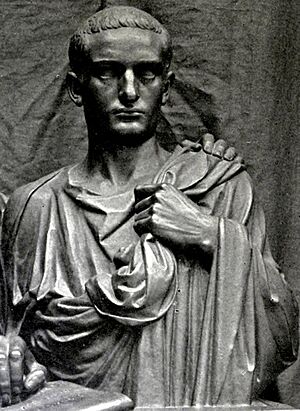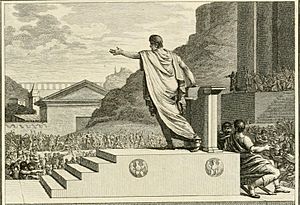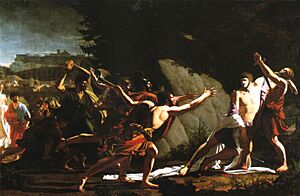Gaius Gracchus facts for kids
Quick facts for kids
Gaius Sempronius Gracchus
|
|
|---|---|

A bust of Gaius from a 19th century commemorative sculpture of the Gracchi brothers by Eugène Guillaume
|
|
| Born | c. 154 BC |
| Died | 121 BC |
| Nationality | Roman |
| Occupation | Politician and soldier |
| Office |
|
| Spouse(s) | Licinia |
| Parent(s) | Tiberius Sempronius Gracchus and Cornelia |
| Relatives |
|
| Military career | |
| Rank | Military tribune and quaestor |
| Wars |
|
Gaius Sempronius Gracchus (around 154 BC – 121 BC) was an important Roman politician and soldier. He lived during the 2nd century BC. He is best known for his time as a tribune in 123 and 122 BC. During this time, he suggested many new laws. These laws aimed to help ordinary Roman citizens. They included plans to create new towns outside Italy. He also wanted to share land more fairly. Other ideas were to change the justice system. He also worked to make sure Romans had enough grain to eat.
The year after his time as tribune, his political rivals used public unrest against him. They declared a special law that allowed them to use force. This led to a fight with his supporters. Gaius Gracchus died during this conflict. After his death, many of his political friends were punished. However, most of his new laws remained in place.
His older brother was Tiberius Sempronius Gracchus. Both brothers were known as the Gracchi brothers. Their father was a famous Roman leader. He was a consul in 177 and 163 BC.
Contents
Gaius Gracchus' Family Background
Gaius Gracchus was born into a very powerful Roman family. His family had many important connections in politics. His father, Tiberius Sempronius Gracchus, was a very successful politician. He served as a consul twice. He was also elected as a censor. A censor was a high-ranking official. His father also celebrated two military victories. One was for bringing peace to Spain for twenty years.
His mother was Cornelia. She was the daughter of Scipio Africanus, a famous Roman general. Cornelia was a very influential woman. After her husband died, she chose not to remarry. She even turned down a marriage proposal from the king of Egypt. Instead, she focused on raising her sons. She wanted them to become great leaders.
Early Steps in Politics
Gaius Gracchus started his career in the Roman army. He served under a general named Scipio Aemilianus. This was during the Numantine War in 133 BC. He might have been a military tribune then. A military tribune was an army officer.
Later, his older brother Tiberius became a tribune. Gaius began his political journey by helping with a land project. This project aimed to give public land to poor families. He was chosen as a commissioner for this task.
In 126 BC, Gaius supported another politician's plans. While in Rome, he spoke against a law. This law wanted to stop non-citizens from living in Roman towns. He was then elected as a quaestor. A quaestor was a financial officer. He was sent to Sardinia to help fight rebels.
During a tough winter, Gaius did well. He managed to get supplies for the Roman soldiers in Sardinia. His commander's time in Sardinia was extended. Gaius wanted to leave and continue his political path. He decided to leave Sardinia early without permission.
When he returned to Rome, he was questioned. He explained that he had served long enough. He also said his good work should be enough. He was later accused of helping a revolt in Fregellae. But he proved he was innocent. He was well-known by the people. He ran for tribune and won.
Gaius Gracchus' Time as Tribune
Gaius was elected as one of the tribunes of the plebs for 123 BC. He quickly started proposing many new laws. He wanted to gain support from different groups of people. He was also known for his powerful speeches. Many people thought he was one of Rome's greatest speakers.
Gaius also changed how speeches were given. Speakers used to face the Senate House. But Gaius would turn to face the public in the Forum. This showed he was speaking directly to the people.
First Year as Tribune (123 BC)
In his first year, Gaius proposed two main ideas. One was to stop any official removed by the people from holding office again. The second law said that citizens had a right to appeal to the people in serious cases. This meant officials who broke this rule could be punished. The first idea was dropped at his mother's request. The second law led to a former consul being sent away from Rome.
He then proposed a grain law. This law set a low price for grain for Roman citizens. The government would buy grain when prices were low. They would store it in public buildings. This helped make sure everyone could afford food. He also brought back his brother Tiberius' law. This law was about sharing farmland.
His brother's land law had been successful. Many land markers from that time are found in Italy. They show that a lot of land was given to poor families. Gaius' new land law helped clarify which land could be shared. He also likely created new Roman towns. These towns were at Scolacium and Tarentum. He was one of the first to realize that Italy did not have enough land for everyone. So, he looked for places to settle people outside Italy.
Gaius also proposed a law for soldiers. This law, called the lex militaris, said soldiers would get clothing from the government. It also said men under seventeen could not be forced into the army. This rule was already in place. Gaius likely just made sure it was followed.
He also passed a law about taxes in Asia. This law gave large companies the right to collect taxes. This helped him gain support from wealthy business people called equestrians. He also tried to include more equestrians in the Senate.
Another important law was the lex Sempronia de provinciis consularibus. This law made the Senate decide on assignments for consuls before elections. This stopped consuls from using their power to get better assignments. Gaius' reforms aimed to fix problems in Roman government. He was a proud aristocrat. He wanted the Senate to lead, but with more checks and balances. His laws also created a new group of powerful tax collectors. The full effects of this were not clear for a while. He also passed laws about new customs duties.
At the elections for 122 BC, Gaius was re-elected as tribune. This was unusual because he was needed in Africa. He was going to oversee building a new town at Carthage. But the people elected him again. His friend Marcus Fulvius Flaccus also became a tribune.
Second Year as Tribune (122 BC)
During his second year, Gaius passed a law about jury trials. This law moved the power to decide corruption cases to the equestrians. This meant that non-senators had more influence in these courts. This law also allowed Roman allies to accuse former officials of corruption.
It was hard to find enough land in Italy for new settlements. Taking land from Roman allies was not popular. So, Gaius and his friends looked to create towns both in Italy and outside. An ally of Gaius, Gaius Rubrius, passed a law to build a new town at Carthage.
Another tribune, Marcus Livius Drusus, tried to counter Gaius' plans. Drusus proposed twelve new towns. Each would have three thousand poor families. The land would be rent-free. Drusus' ideas passed but were never fully carried out. The Senate supposedly encouraged Drusus to challenge Gaius' popularity.
Gaius also proposed giving Roman citizenship to the Latins. He also wanted to give Latin rights to Italian allies. This might have been linked to his land reforms. He may have wanted to show that his brother's land plans would help all of Italy.
Drusus, however, stopped the first bill. The second bill might have given full citizenship to Italians. But even Gaius' ally, Gaius Fannius, opposed it. Drusus offered a smaller bill instead. It would protect Italians from being whipped. This bill passed. Fannius convinced the people that giving citizenship would mean sharing their benefits. He warned that new citizens would "swamp everything."
The issue continued until the consular elections. Fannius issued an order to expel Italians from Rome. Gaius opposed this order. He promised to protect any Italians who stayed. But he could not keep this promise.
Gaius also proposed changing how Roman voting groups voted. He wanted them to vote in a random order. This would not change how much power the rich had. But it would give poorer citizens a better chance. There is no proof this law passed.
During his second term, Gaius left Rome. He went to oversee the new town at Carthage. People said there were bad signs about the new town. The failure of his citizenship bills showed his popularity was fading. He lost when he tried to be re-elected for a third time.
What Happened After Gaius' Death
After Gaius Gracchus died, an investigation began. Many of his supporters were punished. Some were removed from power without a formal trial. Gaius' property was taken. His widow, Licinia, also lost her dowry. However, it is more likely that only their houses were destroyed. Their property probably went to their families.
The consul who led the actions against Gaius, Opimius, tried to make things right. He performed a special ceremony to cleanse the city. He also built a new temple to the goddess Concord. This was meant to show hope for peace in Rome. But many Romans did not agree. Someone carved a message on the temple. It said, "A work of mad discord produces a temple of Concord."
The events of that year continued to cause problems. The next year, Opimius was put on trial. He was accused of breaking Gaius' law. This law said Roman citizens could not be punished without a trial. But Opimius successfully defended himself. He argued that his opponents were not true citizens. This set a dangerous example. It allowed future leaders to use force against their rivals.
However, most of Gaius' laws remained. This showed that winning against rivals was more important than changing specific laws. The law about the African colonies was cancelled. But a new land law continued to share land around Carthage. Other plans for new towns in Italy also continued. The issue of citizenship for Italians was not brought up again for about thirty years. It was like a general dealing with a rebellion. The general agrees to most demands but punishes the leaders. This helps keep control. Overseas colony projects also continued. A few years later, a new town was even established at Narbonne.
In 111 BC, about ten years later, the land commission was finally closed. This was not because of rich people's influence. It was because the job of sharing public lands was finished. All the land shared under Gaius' laws became private property. By then, most public land was used for grazing animals or rented out.
Gaius Gracchus' law about subsidized grain also lasted after his death. It was cancelled later but quickly brought back by another politician.
See also
 In Spanish: Cayo Sempronio Graco para niños
In Spanish: Cayo Sempronio Graco para niños
 | Georgia Louise Harris Brown |
 | Julian Abele |
 | Norma Merrick Sklarek |
 | William Sidney Pittman |



